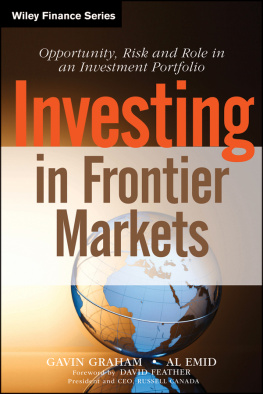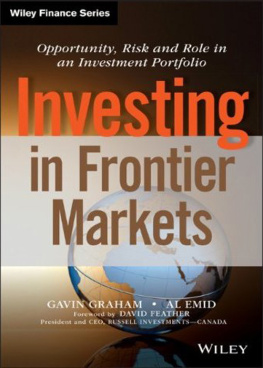Copyright by Christopher Mayer. All rights reserved.
Published by John Wiley & Sons, Inc., Hoboken, New Jersey.
Published simultaneously in Canada.
No part of this publication may be reproduced, stored in a retrieval system, or transmitted in any form or by any means, electronic, mechanical, photocopying, recording, scanning, or otherwise, except as permitted under Section 107 or 108 of the 1976 United States Copyright Act, without either the prior written permission of the Publisher, or authorization through payment of the appropriate per-copy fee to the Copyright Clearance Center, Inc., 222 Rosewood Drive, Danvers, MA 01923, (978) 7508400, fax (978) 6468600, or on the Web at www.copyright.com . Requests to the Publisher for permission should be addressed to the Permissions Department, John Wiley & Sons, Inc., 111 River Street, Hoboken, NJ 07030, (201) 7486011, fax (201) 7486008, or online at www.wiley.com/go/permissions .
Limit of Liability/Disclaimer of Warranty: While the publisher and author have used their best efforts in preparing this book, they make no representations or warranties with respect to the accuracy or completeness of the contents of this book and specifically disclaim any implied warranties of merchantability or fitness for a particular purpose. No warranty may be created or extended by sales representatives or written sales materials. The advice and strategies contained herein may not be suitable for your situation. You should consult with a professional where appropriate. Neither the publisher nor author shall be liable for any loss of profit or any other commercial damages, including but not limited to special, incidental, consequential, or other damages.
For general information on our other products and services or for technical support, please contact our Customer Care Department within the United States at (800) 7622974, outside the United States at (317) 5723993 or fax (317) 5724002.
Wiley also publishes its books in a variety of electronic formats. Some content that appears in print may not be available in electronic books. For more information about Wiley products, visit our website at www.wiley.com .
Library of Congress Cataloging-in-Publication Data:
Mayer, Christopher W., 1972
World right side up: investing across six continents / Christopher W. Mayer.
1 online resource.
Includes index.
Description based on print version record and CIP data provided by publisher;
resource not viewed.
ISBN 978-1-118-17140-0 (cloth); ISBN 978-1-118-22679-7 (ebk);
ISBN 978-1-118-23978-0 (ebk); ISBN 978-1-118-26450-8 (ebk)
1. Investments, Foreign. 2. Investments. 3. International finance. I. Title.
HG4538
332.67 03dc23
2012006627
Foreword: Sometimes It's Different
The material progress in the developed world over the past 300 years is undeniable. But the closer you examine it, the less it appears as a tribute to how clever the human race is, and the more it seems to be an illustration of how lucky Europeans have been.
Europeans embraced the Industrial Revolution. Others did not or could not. Thus, the world turned against the non-Western countries, relatively, at the beginning of the Industrial Revolution. But if the world turns long enough, it comes back to where it began. And such is the case today.
Over the past 10 years, the real, private-sector economies of the developed world have grown at medieval rates. Meanwhile, the emerging markets have enjoyed a growth spurt. They are catching up breathtakingly fast.
When I was a student in 1969, I visited Paris. I went back to live in Paris in 1999, 30 years later. Almost nothing had changed. Same buildings. Same people. Except for the automobiles people drove and the clothes they wore, you would barely know that it had changed at all.
In the early 1980s, I went to China. I was taken to a barren track of dirt and dust and told that a new city, Shenzhen, would be built there. It was hard to believe. The whole country seemed desolate, gritty, and poor. When I returned in 2010, it was not the same country. There are believed to be three times as many people living in Shenzhen as in the whole Paris metropolitan area, and it is only one of dozens of new cities. Beijing, which used to be such a gray, empty, and lifeless place, is a city of gleaming towers, luxury automobiles, and traffic jams that can stretch for a hundred miles.
There is a lesson in all of this.
Most people see material progress as a result of continual innovation, investment, and technical achievement. We have come to see it that way because that is how it has appeared for generations. Once the enlightenment was reached, we thought continued material progress was guaranteed. The scientific method made improvements routine, examing new ideas and re-examined old ones, systematically rejecting what was unsound and adding to the accumulated knowledge of the human race. Freed from the limitations of the past, we could look forward to more wealth and knowledge, forever.
But the world doesn't work that way. No one stays on top for long. Competitors are everywhere.
For example, agriculture seems to have begun in the fertile crescent of Mesopotamia and the Valley of the Nile long before elsewhere. But the richness created by sedentary farming proved a lure for the steppe tribes, who seemed to have had an edge of their own. They had learned how to use the horse, to hunt, and to fight. Mounted warriors raided and later conquered the farmers.
Likewise, the tribes who invented the bow and arrow must have played hell with those who had not.
Technological progress did not bless all of the world's people evenly or at the same time. In the jungles of South America, Southeast Asia, and Africa, as recently as a few years ago, there were people who still lived as they had 10,000 or 20,000 years earlier.
In Europe, Asia, and America at the time of America's discovery, there were advanced civilizations of roughly similar standards of living. (I am probably being a little generous to the Americans of the fifteenth century.) Neither Inca nor Aztec civilizations could rival those of Europe or Asia. The Americans didn't even use the wheel. Still, in 1600, there was probably not much difference between the living standard of a serf in Europe, a slave in China, or a field hand in the Andes.
It is no surprise that those who took up the use of fossil fuels first and most aggressively, backed by institutions and customs that had evolved to suit the new technology, stole a march on their competitors.
Europe, and its colonies, raced ahead on coal-fired trains and oil-fired battleships until it had destroyed the civilizations of the New World and tamed those of Asia. India was host to the French and the Portuguese, before being taken over completely by the English. Japan was forced to open its doors to foreign trade and became a rapid, gifted imitator. China was besieged then battered by Western warships.
The world is different now. It's changing all the time, taking surprising twists and turns that create opportunities for venturesome investors. You'll read about many in this book.
Chris Mayer has traveled around the world looking for these opportunities. Together, we've been to China, attended conferences in France, and dined in Nicaragua. He keeps his eyes and ears open. You'll enjoy reading about, and perhaps profiting from, what he has uncovered.
Bill Bonner
Acknowledgments
Author Albert Jay Nock (18701945) once said, You don't try to repay the help that is given you. You pass it along to others. This book is an effort in that direction, because I can never repay all the help given to me in putting it together.




